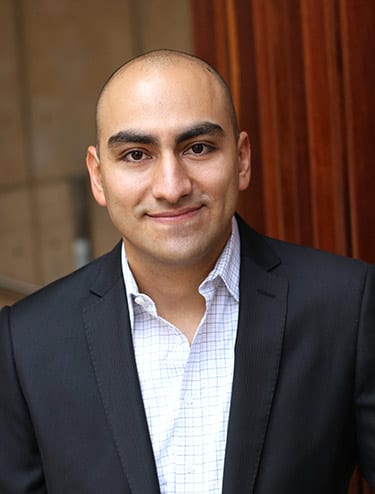By Andrew Cohen

Oscar Sarabia Roman has rarely felt at home. The winner of BARBRI’s One Lawyer Can Change the World Scholarship thinks that will change in August, when he arrives at Berkeley Law.
“I love how the school connects with the surrounding community,” Roman says. “I don’t want to stay isolated in an academic bubble, and Berkeley really values training their students through meaningful work with clients in need.”
A BARBRI Law Preview panel chose Roman’s winning essay from more than 1,200 entries—including two other incoming Berkeley Law students who were among the 10 finalists, Casey Duckworth and Ashley Johnson. He described migrating to the United States as a young child, getting deported 15 years later, and wanting to become a lawyer who could “impact the lives of those who need a voice.”
Having grown up in a low-income, undocumented, immigrant household, Roman could never afford more than bare necessities. He says the $10,000 scholarship will improve his ability to become a public interest lawyer and advocate for undocumented people across the country.
In the scholarship announcement, BARBRI Law Preview President Don Macaulay said, “While each of the top 10 finalists’ essays demonstrated a true commitment to becoming change agents, Oscar’s personal story and his fiery resilience made us confident that, when armed with a law degree, his impact will be massive.”
A turbulent path
Roman was just five when his family took a Greyhound bus from Mexico to the United States. The five of them stayed with relatives in Sacramento, lived in a nearby trailer for years, and later shared a one-bedroom apartment. While seeking a brighter future, they understood their freedom restrictions.
“There were many limitations in terms of going out, given the huge fear of getting caught or even stopped by police,” Roman recalls. “I didn’t leave California until I was in high school, and I obviously couldn’t get a driver’s license. I stayed home and read a lot.”
While attending Sacramento City College, his life turned upside down on October 29, 2008, when Immigration and Customs Enforcement agents arrived at his family’s residence.
“They knocked on the door around 7 in the morning,” Roman says. “My mother and I were handcuffed, put on a bus for three hours, and then put on a plane. By midnight, we were in Tijuana.”
For much of the next four years, Roman worked for an AT&T call center providing network support to customers—and embarked on a dogged push to return to the U.S.
Doing it himself
Because his father was a permanent U.S. resident, Roman applied to re-enter as his unmarried son. It took him four years, three rounds of interviews and medical testing, and more than 600 pages of application paperwork to return to Sacramento.
“The lawyer I first used wasn’t much help, unfortunately, so I decided to do my own application,” Roman says. “Looking back, it was both daunting and empowering. There’s a massive amount of detailed paperwork, and any little mistake means everything gets sent back and delays the process.”
When his application was finally approved, Roman returned to Sacramento City College and then transferred to Stanford. There, he served as president of the school’s Transfers Network and graduated with a B.A. in Public Policy and a concentration in Law and the Legal System.
Roman spent last summer in Washington, D.C., researching policy issues for then California Congressman Xavier Becerra, now the state’s attorney general. He also served on the board of a nonprofit that helps undocumented students (Alianza), and conducted research on impact litigation cases at the ACLU Immigrants’ Rights Project in San Francisco.
“I think we need to personalize the immigration debate more, because it isn’t a faceless issue,” Roman says. “It’s not just the stereotypical lawnmower or construction worker. These are professionals, people who live down your street, people you work with every day.”
Berkeley bound
Now pursuing a joint Masters of Public Policy and Law degree, Roman spent last year working on the former at Harvard.
“Quite a culture shock,” he says. “It was my first time living on the east coast, and I found the environment to very privileged, formal, and wealthy compared to California, which is more laid-back and more diverse. But it was a great learning experience and taught me new ways to advocate for reform.”
When it came to choosing a law school, the volume of Berkeley Law’s community-facing work and its strong public-interest infrastructure appealed to Roman—particularly the East Bay Community Law Center (EBCLC) and the Thelton E. Henderson Center for Social Justice.
“Speaking to people there was very valuable,” he says. “They understand how crucial it is for different voices, viewpoints, and experiences contribute to the decisions that impact the law and our balance of power. Most people making those decisions have never been affected by the policies they’re shaping.”
Says Macaulay, “It is essential to support compassionate, service-driven lawyers like Oscar—those who are committed to using their education and expertise to advocate on behalf of those who are most vulnerable. The value of a lawyer who has firsthand experience with the system he seeks to change cannot be overstated.”